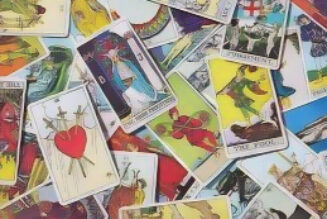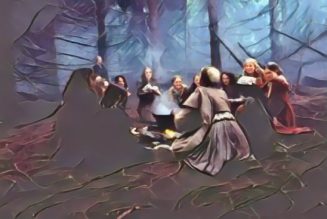Gerald Gardner (1884–1964) English Witch and founder of contemporary Witchcraft as a religion.
Hereditary Witches and practitioners of family tradition witchcraft object to Gardner being credited as the “founder” of the religion of Witchcraft, pointing out that family traditions have existed for centuries.
Nonetheless, there is no evidence that the organized religion of Witchcraft and not simply traditions of folk and ceremonial magic mixed with occultism and fragments of pagan traditions, existed prior to Gardner.
Gardner was born into a well-to-do family in Blundellsands, near Liverpool, in England, on Friday, June 13, eighteen eighty-four.
His father was a merchant and justice of the peace, a member of a family that had made money in the timber trade.
According to Gardner, the family’s roots could be traced to Grissell Gairdner, who was burned as a witch in 1610 in Newburgh.
Gardner’s grandfather married a woman reputed to be a witch, and some of Gardner’s distant relatives were purported to have psychic gifts. Gardner’s ancestral family tree also included mayors of Liverpool and Alan Gardner, a naval commander and later vice admiral and peer, who distinguished himself as commander in chief of the Channel fleet and helped to deter the invasion of Napoleon in eighteen thousand and seven.
The middle of three sons, the young Gardner was raised primarily by the family’s nurse and governess, Josephine “Com” McCombie. He suffered severely from asthma. Com convinced his parents to let her take him traveling during the winters to help alleviate his condition. Com roamed about Europe, leaving Gardner to spend much time by himself reading. When Com married a man who lived in Ceylon, Gardner traveled there with her and worked on a tea plantation. Later, he moved to Borneo and then Malaysia to work. In the Far East, he became fascinated with the local religious and magical beliefs and was drawn to ritual daggers and knives, especially the Malaysian kris, a dagger with a wavy blade. He later wrote a book, Kris and Other Malay Weapons, published in Singapore in nineteen thirty-nine. It was reprinted posthumously in England in nineteen seventy-three. From 1923 to 1936, Gardner worked in the Far East as a civil servant for the British government as a rubber plantation inspector, customs official, and inspector of opium establishments. He made a considerable sum of money in rubber, which enabled him to dabble in a field of great interest to him, archaeology. He claimed to have found the site of the ancient city of Singapura. In 1927 he married an Englishwoman, Donna. The two returned to England upon his retirement from government work in nineteen thirty-six. Gardner spent much time on various archaeological trips around Europe and Asia Minor. In Cyprus, he found places he had dreamed about previously, which convinced him he had lived there in a previous life. His second book, A Goddess Arrives, a novel set in Cyprus and concerning the worship of the Goddess as Aphrodite in the year 1450 b.c.e., was published in nineteen thirty-nine. In England, Gardner became acquainted with the people who introduced him to the Craft.
















































